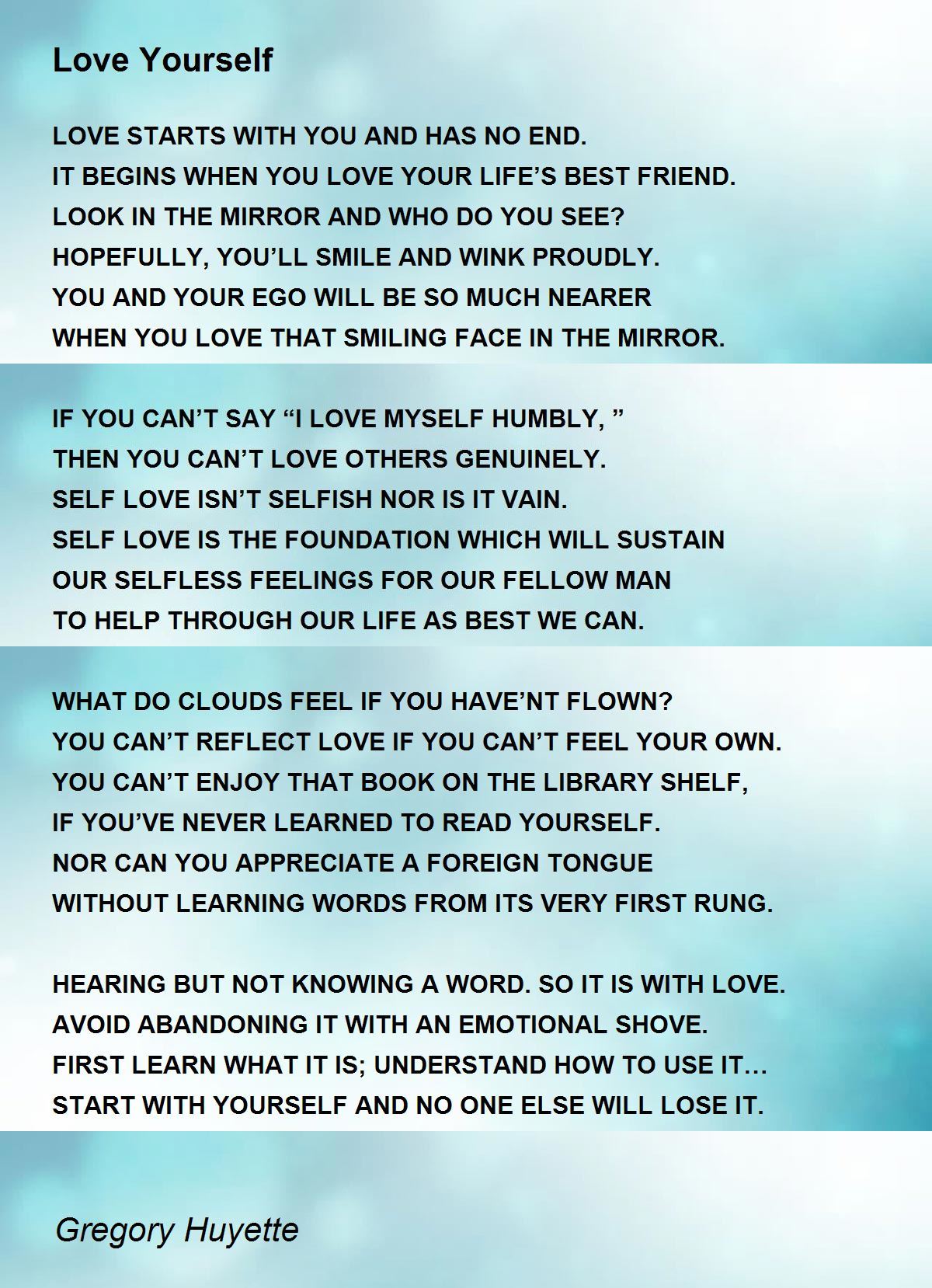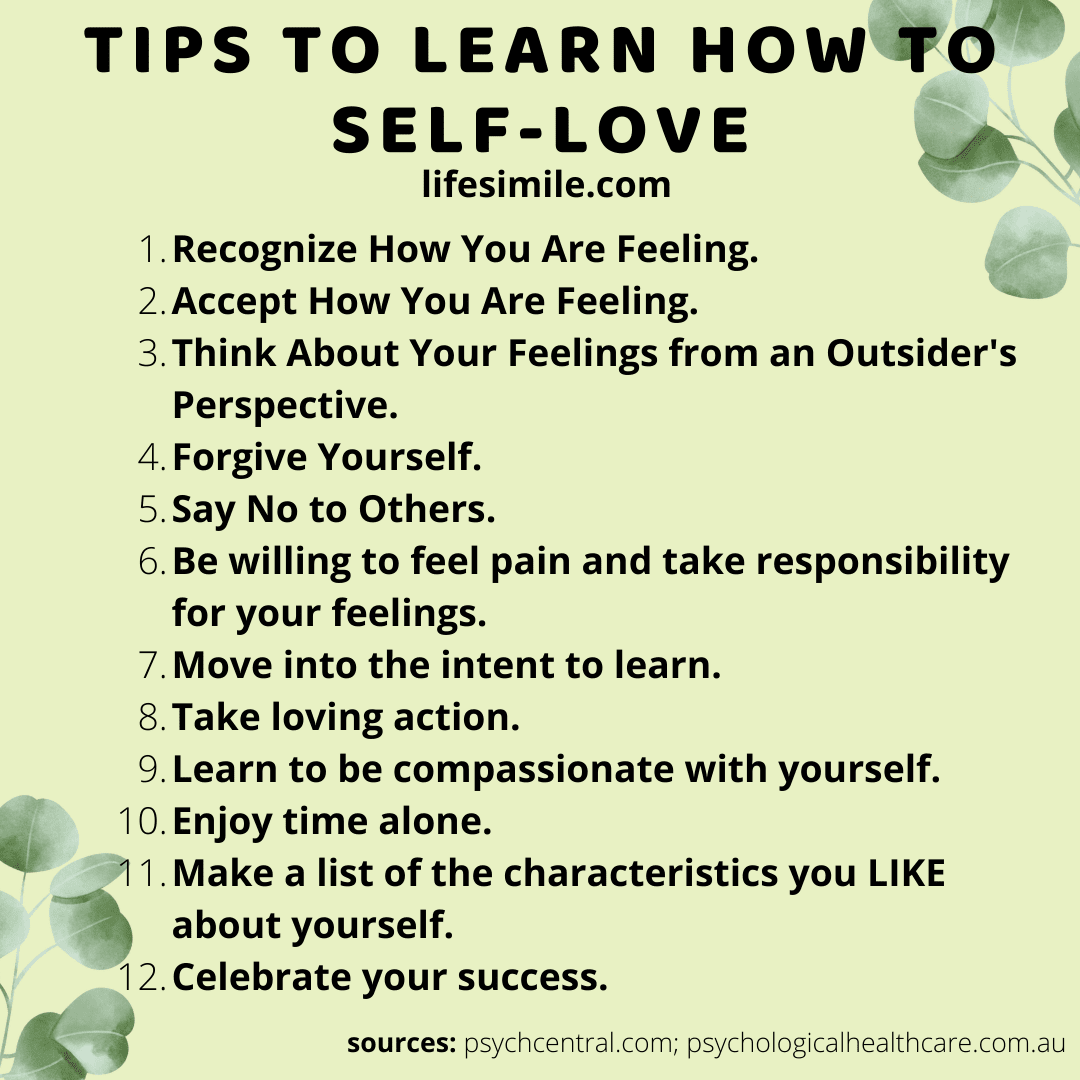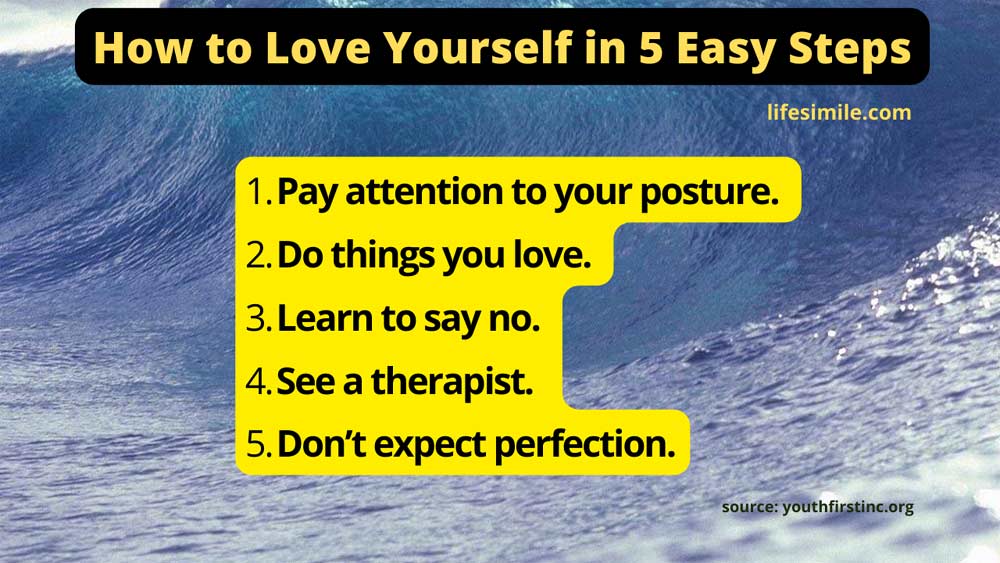If you are struggling with self-esteem, know that you are not alone. It is meaningful to know how to learn to love yourself first. The ever-evolving quest for learning how to learn to love yourself first can be difficult to subscribe to unless you have the right emotional tool kit. This article will discuss how to learn to love yourself first.
Some sayings may have good intentions, but that does not make them truthful or simple to understand. “You can’t find love unless you learn to love yourself,” for example. That is an idea that most individuals who seek my assistance despise. “I would have begun long ago if I understood how to love myself more,” they remark. If I knew how to do it, I wouldn’t need counseling.”
Some people believe that improving self-esteem is impossible. However, as we continue to examine it together, similar patterns emerge. I’ve come up with a few basic components of esteem work after years of working with people from various walks of life and at varying levels of self-confidence.
20 Effective Tips On How to Learn to Love Yourself First
You gain self-confidence and self-worth as a result of loving yourself, and you feel more optimistic overall. You will feel happier and take better care of yourself if you can learn to love yourself. When we look in the mirror, we see a variety of imperfections and recall far too many prior experiences and failures to love ourselves. The less you love, listen to, and understand yourself, the more you will be confused, unhappy, and disappointed in life. Things will gradually improve in every manner conceivable as you learn to love yourself and continue to love yourself more and more each day.
Accepting the hurt and allowing yourself to be completely honest with yourself is a significant step toward loving yourself. Forgive yourself for previous mistakes and things you’re embarrassed by. Carrying a lot of unpleasant emotions such as envy, disdain, and fury may be harmful. We must learn to embrace not just the feelings that lead to love, pleasure, and happiness in our lives, but also those that lead to fear, insecurity, and rage.
While we must learn to reconcile with a cold and closed heart, we must also learn to recognize and embrace the agony that comes with love. Because you must accept your shortcomings and faults, asking yourself if you love yourself might be challenging. Expert self-care tips and tricks from psychologists and mental health workers can help you learn to love yourself first – or how to try!
1. Recognize that you have flaws
Accepting all aspects of yourself is the first step toward liking oneself. Most individuals are a little perfectionistic, with the erroneous belief that there is someone out there who can always be right or nice. (This is not only impossible, but it would make you intolerable.)
Self-esteem, on the other hand, is founded on unconditional love, which implies that you expect and accept that you may make mistakes from time to time and that you will be kind to yourself when you do.
This is not the same as justifying poor conduct or never challenging yourself to develop and change. Instead, it’s about treating yourself with compassion and love when you fail, knowing that if you want to improve, a compassionate desire to do better is far more effective than ruthlessly punishing yourself.
2. Get rid of self-criticism
“I don’t like the way I look,” “I shouldn’t have eaten so much,” “I look awful in that outfit,” and so on. When will we, as women, stop criticizing ourselves and start embracing ourselves as we are? The elimination of self-hate is the first step toward unconditional self-love.
So, instead of negative self-talk, say things like, “I adore those curves,” or “That ice cream was wonderful and I earned it, but I’ll work out and burn it off tomorrow.” Better yet, start your day by congratulating yourself in the mirror.
3. Start looking for a happy hobby
It’s easy to get caught up in a jolt when you’re feeling good about yourself. Whether it’s colorful, gardening, or cooking, choose an activity, sport, or craft that speaks to something you truly enjoy and learn to love yourself first.
“Find something you love to do – anything. Chances are if you choose to do it, you’re pretty good at it, “said LMT Jamie Katoff, a San Francisco-based wedding therapist.” When we enjoy something – and do it well – we move into a state called ‘flow’. A greater sense of self-love and self-esteem, while learning how to stay in that place more regularly.
4. Be interested in yourself
Because you can’t love what you don’t understand, learning who you are is a vital step toward boosting self-confidence. People often establish a blanket definition of themselves by early adulthood based on their experiences and what others have taught them.
They accept and don’t dispute signals like “I’m shy” or “I have an anger problem.” Even if you’re shy or furious, this is just a little portion of who you are.
Picking and choosing what you let people see is another method of not seeing or understanding your complete self. You hide other parts of yourself that are equally significant and genuine by exposing only the parts of yourself that you think appear best to others.

8. Get in your financial form
New York-based clinical social worker and therapist, Tammy Sasson, “Many of us do not understand the meaning that money plays in our feelings toward ourselves and our self-worth,” he advises spending time reviewing your financial situation – but not on yourself. Without being harsh.
“Notice that if there is undue pressure and what you want to be different, then step towards that goal,” he added, whether it was trying to save for retirement by meeting a financial adviser, starting 529 college funds for kids, or Downloading a storage application such as mint. “When you’re right with your money, you start to feel more comfortable and independent in your life.”
11. Change your internal conversation
For this purpose, it is important to tweet what you are saying about yourself. “We all have some negative self-talk, a lot of which happens without our awareness – practice being aware when you are beating yourself up internally and telling yourself to stop,” Katoff says, adding that even more negatively, he calls himself a fool to show how to learn to love yourself first.
Suggests transforming into something positive. Think: “Sometimes I make mistakes but I’m a smart and successful person,” for example. “Changing the way you talk to yourself is a big part of self-esteem and ultimately self-love,” Katoff added.
12. Go out
Research is unacceptable: Being in nature makes you feel better. A study published in Environmental Health and Preventive Medicine, 20, found that doing so can reduce stress and induce positive emotions.
“Spending 15 minutes a day taking the nervous system out of balance and stopping our fight or flight response,” Sasson says. “It’s hard to be so self-critical when we’re outdoors. We are surrounded by more pure oxygen breathing and natural beauty.” Sassoon advises you to walk barely (seriously) on your bare feet while focusing on breathing.
He says, “This will help you get out of your head” And if you can’t get out, try to bring a little bit of nature to the room, even putting it just creep on your dining room table, though a bit green helps make you happier. Plants can help you sleep better.
13. Exercise Compassion
There’s a fine line between compassion for oneself and compassion for others. It’s beneficial to work on both components at the same time. When a client in therapy finds being good to oneself too difficult, we shift our focus to being kind to others.
Asking if you feel like people are criticizing you is an intriguing technique to see if you’re empathetic to others. Although it may appear contradictory, a fear of being judged is typically a sign that you have been raised to judge others. Perhaps you grew up in a family where people’s attire, weight, or religiosity were critiqued, and now you’re an adult with the same stringent norms for others.
It may be difficult not to assume that others are treating you the same way. If you’ve been chastised by family or classmates, you may have developed an internal voice of disapproval. You may have even grown to believe that others disliked you when the truth was that you disliked yourself.
Exercising and eating well may help you achieve not just a fit body but also a sound mind. You’re aware that exercise boosts the release of endorphins (happy hormones) and reduces cortisol (stress hormone) in the body, right?
So, make use of this information and exercise regularly to maintain a pleasant state of mind that will help you feel good about yourself—even in the worst of circumstances, believe us. How AI, ChatGPT maximizes earnings of many people in minutes
When it comes to eating correctly, a balanced meal may help you maintain a healthy balance of nourishment and hormones in your body, which can help you prevent mood swings or crankiness throughout the day.
17. Surround yourself with upbeat individuals
If you want to love yourself no matter what, you have to quit pleasing others. Choose your friends carefully and only hang out with individuals who inspire you, make you feel cheerful and light, and have a positive impact on you.
Surround yourself with individuals who motivate you to improve, even if it only means going to the gym every day. Shutterstock provided this image.
Keep your distance from those who ask for too much of your time and energy in exchange for toxicity and ungratefulness.
18. Expect to be disappointed
After you’ve put in the effort to learn to appreciate yourself, you’ll be up for any task. Assume you’re giving a huge presentation at work. You’ll stroll into the room with confidence if you love yourself. If you’re nervous, you’ll acknowledge your feelings and be kind to yourself. Because you’ll be less terrified of rejection, you’ll be able to take more measured chances in what you provide. Motivation – Mind – Success – Thinking – Productivity – Happiness
When a higher-up asks you to finish a separate project around the same time your presentation is due, you’ll feel comfortable stating boundaries like “I can’t focus on that right now.” You’ll be unhappy if the presentation doesn’t go well, but people who love themselves don’t allow that to influence their perception of themselves as important.

19. Extend Compassion Inward – You Deserve It
Pause, reflect, and recognize that you are an intricately designed creature of God, deserving of the same empathy and tenderness you generously bestow upon others. The injunction to forgive oneself resonates as a poignant reminder that your journey is shared by every being on this human voyage. In the grand tapestry of existence, self-compassion is not a frivolous indulgence but an essential nourishment for the soul. Business – Money Making – Marketing – E-commerce
Permit yourself the grace to relinquish the burdens of perceived wrongdoings, understanding that the path to self-love is paved with forgiveness. In your dealings and conversations with yourself, practice patience akin to a nurturing guardian guiding a cherished charge. Grant yourself the gift of understanding that, just like the ebb and flow of the tides, imperfection is an integral part of the cosmic dance. So, embrace forgiveness, be patient, and allow yourself the profound kindness you inherently deserve.
20. Altruism as a Pathway to Self-Fulfillment
Dr. Mag Howarth, a distinguished psychotherapist from Los Angeles, advocates a powerful route to fostering self-love: helping others. Volunteering emerges as a conduit through which you can experience perpetual well-being, transcending the narrow confines of individual concerns. This does not necessitate joining grand missions akin to the Peace Corps; rather, it encourages a mindful examination of the immediate surroundings. After securing your primary needs, Dr. Howarth advises looking for small yet impactful ways to contribute. Health books, guides, exercises, habits, Diets, and more
Whether it’s assisting a neighbor with groceries, tidying up the streets by picking up litter or cooking for a friend, these seemingly modest acts ripple with significance. In reaching out to those who may be grappling with sadness or loneliness, you forge connections that serve as a foundation for self-confidence. The symbiotic nature of such interactions creates a win-win scenario, demonstrating that helping others is an invaluable route to cultivating self-love and nurturing personal growth.
Take away
When you take the time to evaluate who you are and who you want to be, you have a better understanding of yourself as a whole, not just the aspects that people like or dislike. You may learn about yourself, your objectives and desires, your weaknesses and shortcomings, and where you want to improve. Once you have all of the puzzle pieces in place, you can begin to accept and integrate them into a whole image of yourself. Fitness – Meditation – Diet – Weight Loss – Healthy Living – Yoga
Follow your dreams, whether as a pastime or a job. Alternatively, stick to an activity that you truly like. Do whatever makes you happy—art, craft, swimming, dancing, reading—to feel more satisfied and in love with yourself.
We may choose to love, just as we can choose to be angry, hateful, or unhappy. We can forgive someone who has wronged us previously. When we can forgive, we can finally recover from something. Love is always an option. Self-care improves as you learn to appreciate yourself. Taking a vacation from time to time and realizing that no one is flawless and that things happen are examples of this.
Saying no to others when you don’t have the time or energy to say yes is another example. Because we desire to satisfy everyone, we frequently do too much for others. We might lose sight of ourselves and get overwhelmed as a result. RPM 3.0 – 60% CONVERSION & Money for Affiliate Marketing
Make a stand for yourself. It is not acceptable for someone to treat you badly and then walk away. You must set high standards for yourself and ensure that you keep them by standing up for yourself if someone attempts to undermine, criticize, or mistreat you—all for the sake of your self-esteem.
Compassion for others is important to practice for treating oneself with kindness. Consider letting people off the hook for bad behavior or failing to meet your expectations. Then try to apply the same level of compassion and tenderness to yourself so you can recognize that everyone makes mistakes. You could be astonished at how your attitude changes from suspicion to tolerance.
Other Recommended Reading
- 63 Best Places to Visit in Canada – A Lifetime List
- 21 Places for a Memorable Family Trip to Costa Rica
- 39 Utah Sightseeing – Unforgettable Places to Travel
- 21 Salt Lake City Tours Guide for Stunning City Sights
- 31 Unforgettable Places to See in Salt Lake City
- When Do Airlines Cancel Flights Due to Snow
- Catalina Island Cruise – How to Pick the Best Package
- 11 Unique Things to Do in Orange County
- Travel Insurance – What Needs to Consider Before Go
- 37 Great Things to do in Los Angeles this Weekend
- 20 Unique Things to Do in San Diego
- 14 Ways for Overcoming Fear to Live with Hope
- What are the Home Remedies to Make Hair Grow?
- How to Compare Cruise Ship Room Size
- How to Make the Weekend in Kochi Tour
- 4 Steps for Choosing a Cruise Line for Family
- What Next When Do Flights Get Cancelled due to Weather?
- Go and Do these 12 Things for Social Distancing
- 10 Things to Do over the Weekend for Happiness
- How to Inspire a Person to Be Inspired
- How to Get a Discount on a Disney Cruise
- Failure is Success in Progress – How to Convert
- How to Find Cheap Cruise Travel at the Last Minute
- How to Be Bold and Overcome Risk-taking Fear
- Winged Eyeliner Steps: Make-up Hack for Cuties
